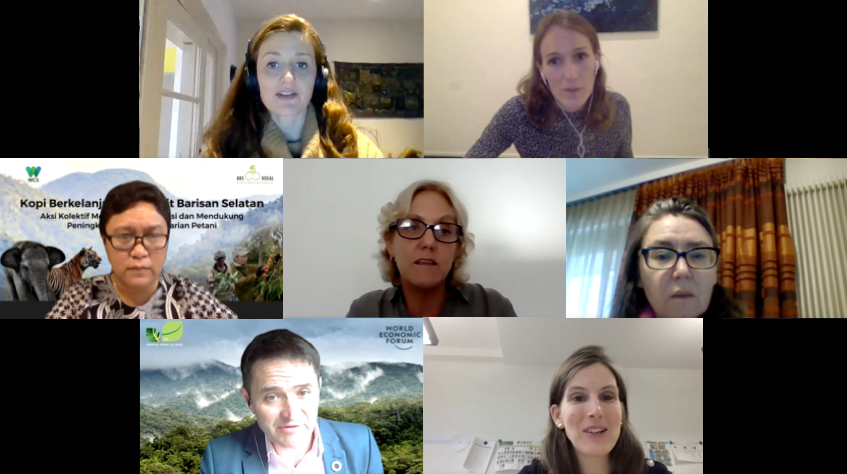A ‘Forest-First Approach’: supporting the effective implementation of deforestation-free supply chains in producer countries
Natural, intact forests and other ecosystems are indispensable for human health, livelihoods, and food security worldwide, and yet they are still being lost and degraded, especially in the tropics. The Wildlife Conservation Society (WCS) hosted a virtual event on 11th December 2020 on the ‘Forest-First Approach’, a new framing that addresses supply chain risk and reduces deforestation and biodiversity loss at the forest and farm frontier.
This webinar, which was moderated by Ms Daphne Hewitt, Senior Forestry Officer and Team Leader, FAO-EU FLEGT Programme at FAO, engaged government, scientists and civil society representatives in a panel discussion. The panellists discussed how different stakeholders can work together to ensure that supporting actions can accompany new legal tools to have the highest impact on effectively combatting deforestation and forest degradation linked to commodity production in producer countries. Much of the political attention has been currently focused on the development of new European Union (EU) legislation to ensure commodity imports are free from deforestation and forest degradation, but less attention is being given as to how their implementation in producer countries can best be supported. The event also marked the launch of an upcoming research report, led by WCS, that outlines the need for new approaches to target engagement and support to the forest frontier to achieve tangible reductions in deforestation.
 (From top to bottom, left to right): Janice Weatherley-Singh (WCS EU), Leonie Lawrence (WCS), Jeni Pareira (WCS Indonesia), Daphne Hewitt (FAO), Chantal Marijnissen (DG DEVCO), Justin Adams (TFA), Lisa Kirfel-Rühle (BMZ).
(From top to bottom, left to right): Janice Weatherley-Singh (WCS EU), Leonie Lawrence (WCS), Jeni Pareira (WCS Indonesia), Daphne Hewitt (FAO), Chantal Marijnissen (DG DEVCO), Justin Adams (TFA), Lisa Kirfel-Rühle (BMZ).
Ms Leonie Lawrence, Technical Advisor - Forest Risk Commodities at WCS presented the preliminary recommendations of a new research report, led by WCS, that outlines the need for new approaches to target engagement and support to the forest frontier to achieve tangible reductions in deforestation. The presentation explored the interplay between deforestation trends and current implementation challenges and proposed a new risk-based framing for action on deforestation that prioritises efforts towards supporting smallholder farmers at the farm and forests frontier.
Ms Jeni Pareira, Sustainable Landscapes Programme Manager at WCS Indonesia, followed by presenting case studies on the need for smallholder engagement in support of forest conservation from two critical forest landscapes in Indonesia, the Bukit Barisan Selatan landscape and the Rawa Singkil Wildlife Reserve, to show how this plays out in practice. In particular, she highlighted the importance of multi-stakeholder partnerships along the supply chain to reduce deforestation but also to improve farmer livelihoods.
Ms Chantal Marijnissen, Head of Unit Environment, Natural Resources, Water at DG DEVCO, European Commission, highlighted the importance of protecting forests. She spoke about DEVCO’s work and the development of new EU Forest Partnerships with key producer countries as a contribution to implementing the EU Green Deal and to helping combat climate change and the biodiversity crisis. The aim of these partnerships is to protect, restore and ensure the sustainable use of forests in an integrated way, also for the socio-economic development of the people who depend on them.
Ms Lisa Kirfel-Rühle, Deputy Head of Division – Agriculture Policy, Agriculture, Innovation at the German Federal Ministry for Economic Cooperation and Development (BMZ), German EU Council Presidency, highlighted that we must ensure that smallholders can earn a living income while not cutting down forests – both by creating incentives for companies to get engaged with smallholders and by support from the EU and member states. Therefore, BMZ expects the EU Forest Partnerships to provide significant support to production countries for reducing commodity-driven deforestation. On demand-side, BMZ strongly welcomes that the European Commission will present a legislative proposal addressing the risk of deforestation in products placed on the European market in 2021.
Mr Justin Adams, Executive Director at the Tropical Forest Alliance (TFA), brought a private sector viewpoint to the deforestation-free supply chain discussion. He highlighted five critical actions that should be integrated into a ‘smart mix’ of measures the EU should adopt to tackle imported deforestation: (1) partnerships between the forested countries in the global South and importing countries and regions such as the EU and China; (2) demand-side measures such as due-diligence legislation; (3) dialogues with other consumer countries and consumer regions; (4) sustainable finance and innovative instruments; and (5) robust verification to measure and track progress. These recommendations emerged in a new position paper signed by more than 50 leading companies and NGOs after an extensive 6-month multi-stakeholder consultation process.
In the concluding remarks, Janice Weatherley-Singh, Director, EU Strategic Relations at WCS EU reiterated that this dialogue will be continued, and will share when ready for publication the report "A ‘Forest First’ Approach: A new framing to address supply chain risk and reduce deforestation at the forest and farm frontier".